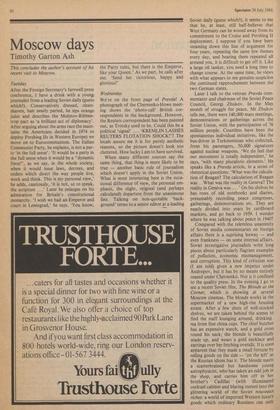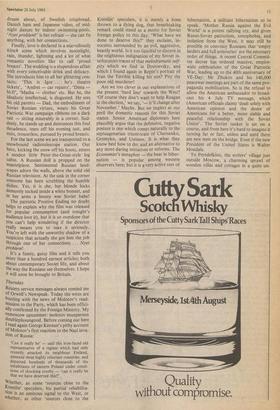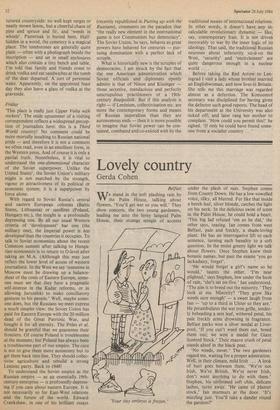Moscow days
Timothy Garton Ash
This concludes the author's account of his recent visit to Moscow.
Tuesday
After the Foreign Secretary's farewell press conference, I have a drink with a young journalist from a leading Soviet daily (guess which!). Conservatively dressed, clean- shaven, hair neatly parted, he sips orange juice and describes the Molotov-Ribben- trop pact as 'a brilliant act of diplomacy'. After arguing about the arms race (he main- tains the Americans decided in 1974 to deploy Pershing Its in Western Europe) we move on to Eurocommunism. The Italian Communist Party, he explains, is not a par- ty 'in the full sense'. 'It would be a party in the full sense when it would be a "dynamic force", as we say, in the whole society, when it would issue laws, decrees, and orders which direct the way people live, work and think. This is my personal view,' he adds, cautiously, 'it is not, so to speak, the scripture ... ' Later he enlarges on his admiration for Britain's constitutional monarchy. 'I wish we had an Emperor and court in Leningrad,' he says. 'You know, the Party rules, but there is the Emperor, like your Queen.' As we part, he calls after me: 'Send her victorious, happy and glorious!'
Wednesday
We're on the front page of Pravda! A photograph of the Chernenko-Howe meet- ing shows the 'photo-call' British cor- respondents in the background. However, the Reuters correspondent has been painted out, as Trotsky used to be. Could this be a political 'signal' ... 'KREMLIN LASHES REUTERS FLOTATION SHOCK!'? The locals assure me it is for purely aesthetic reasons, so the picture doesn't look too cluttered. How lucky I am to have survived.
When many different sources say the same thing, that thing is more likely to be true — another basic rule of journalism which doesn't apply in the Soviet Union. What is most interesting here is the occa- sional difference of view, the personal em- phasis, the slight, original (and perhaps calculated) departure from the unanimous line. Talking on non-quotable 'back- ground' terms to a senior editor at a leading Soviet daily (guess which!), it seems to me that he, at least, still half-believes that West Germany can be wooed away from its commitment to the Cruise and Pershing II deployment. I suppose if you have been steaming down this line of argument for four years, repeating the same few themes every day, and hearing them repeated all around you, it is difficult to get off it. Like a large oil tanker, you need a long time to change course. At the same time, he views with what appears to me genuine suspicion the continued rapprochement between the two German states.
Later I talk to the veteran Pravda com- mentator and chairman of the Soviet Peace Council, Georgi Zhukov. In the May month of struggle for peace, Mr Zhukov tells me, there were 140,000 mass meetings, demonstrations or gatherings across the Soviet Union, with the participation of 76 million people. Countless have been the spontaneous individual initiatives, like the bus-driver in Turkmenistan who collected, from his passengers, 50,000 signatures against nuclear weapons. 'We do feel that our movement is totally independent,' he says, 'with many pluralistic elements.' He speaks like a Pravda article, in a series of rhetorical questions: 'What was the calcula- tion of Reagan? The calculation of Reagan was .. What was the reality in Geneva? The reality in Geneva was ... ' On his shelves he has rows of old notebooks and diaries, presumably recording peace congresses, gatherings, demonstrations etc. They are neatly divided into years by cardboard markers, and go back to 1939. I wonder where he was talking about peace in 1940?
Compared with the relentless unanimity of Soviet media commentaries on foreign affairs there is a suprising leeway — and even frankness — on some internal affairs. Soviet investigative journalists write long pieces about particularly flagrant examples of pollution, economic mismanagement, and corruption. This kind of criticism was (I am told) given a new impetus under Andropov, but it has by no means entirely ceased under Chernenko. Nor is it confined to the quality press. In the evening I go to see a recent Soviet film, The Blonde at the Corner, which is showing at several Moscow cinemas. The blonde works in the supermarket of a new high-rise housing estate. After a few shots of well-stocked shelves, we are taken behind the scenes to find the staff lounging around, drinking tea from fine china cups. The chief butcher has an expensive watch, and a gold cross round his neck; the blonde is beautifully made up, and wears a gold necklace and earrings over her fetching overalls. It is soon apparent that they made a small fortune by
selling goods on the side — 'on the left' as the Russian idiom has it. The blonde meets a scatterbrained but handsome young astrophysicist, who has taken an odd job in the shop, and carries him off in her
brother's Cadillac (with illuminated cocktail cabinet and blaring stereo) into the glittering world of the Soviet nouveaux riches: a world of imported Western luxury goods which ordinary Russians can only
dream about, of Swedish crispbread, Danish ham and Japanese video, of mid- night dances by indoor swimming-pools. 'Nyet problem!' is her refrain — she can fix anything, with her connections.
Finally, love is declared in a marvelously kitsch scene which involves moonlight, rain, thunder, lightning and a lot of what romantic novelists like to call 'proud breasts'. The wedding is a stupendous affair with every conceivable drink and delicacy. She introduces him to all her glittering con- tacts: 'This is Igor .... he's theatre tickets', 'Andrei — car repairs', `Dima hi-fi', 'Masha — clothes' etc. But he, the idealistic intellectual, is disgusted. He sees his old parents — Dad, the embodiment of Soviet Russian virtues, wears his Great Patriotic War campaign ribbons on a dark suit — sitting miserably in a corner. Sud- denly, he stands up and denounces this foul decadence, tears off his evening suit, and exits, trouserless, pursued by proud breasts.
For the last scene we are transported to a snowbound radiotelescope station. Our hero, kicking the snow off his boots, enters a modest little Peter-the-Great-style log cabin. A Russian doll is propped on the mantelpiece. Sentimental Russian land- scapes adorn the walls, above the solid old Russian television. At the sink in the corner someone has been scrubbing the humble dishes. Yes, it is she, her blonde locks demurely tucked inside a white bonnet, and in her arms a bonny wee Soviet babe!
The patriotic Positive Ending no doubt helps to explain why the film was released for popular consumption (and tonight's audience love it), but it is so overdone that you can't help wondering if the director really means you to take it seriously. You're left with the unworthy shadow of a suspicion that actually she got him the job through one of her connections ... Nyet problem!
It's a funny, gutsy film and it tells you more than a hundred earnest articles; both about contemporary Soviet life, and about the way the Russians see themselves. I hope it will soon be brought to Britain.
Thursday Reuters service messages always remind me of Orwell's Newspeak. Today the wires are buzzing with the news of Molotov's read- Mission to the Party, which has been offici- ally confirmed by the Foreign Ministry. My exmoscow upsummer: molotov exunperson doubleplusungood. Before coming out here I read again George Kennan's pithy account Of Molotov's first reaction to the Nazi inva- sion of Russia:
'Can it really be' — said this iron-faced old representative of a regime which had only recently attacked its neighbour Finland, annexed three highly reluctant countries, and deported hundreds of thousands of the inhabitants of eastern Poland under condi- tions of shocking cruelty — 'can it really be that we have deserved this?'
Whether, as some 'sources close to the Kremlin' speculate, his partial rehabilita- tion is an ominous signal to the West, or whether, as other 'sources close to the
Kremlin' speculate, it is merely a bone thrown to a dying dog, that breathtaking remark could stand as a motto for Soviet foreign policy to this day. 'What have we done to deserve this?' they exclaim, in- nocents surrounded by an evil, aggressive, beastly world. Is it too fanciful to discern in the reighteous indignation of my Soviet in- terlocutors traces of that melodramatic self- pity which we find in Dostoevsky, and which I found again in Repin's portrait of Ivan the Terrible killing his son? Pity the poor old murderer!
Are we too clever in our explanations of the present 'hard line' towards the West? 'Of course they don't want to help Reagan in the election,' we say, '— it'll change after November.' Maybe. But we neglect at our peril the domestic reasons for this Soviet stance. Senior American diplomats here plausibly argue that the defensive, negative posture is one which comes naturally to the septuagenarian triumvirate of Chernenko, Gromyko, and Ustinov. It is what they know best how to do; and an alternative to any more daring initiatives or reforms. The Economist's metaphor — the bear in hiber- nation — is popular among western observers here; but it is a very active sort of hibernation, a militant hibernation so to speak. 'Mother Russia against the Evil World' is a potent rallying cry, and given Russo-Soviet patriotism, xenophobia, and isolation from the West, it may still be possible to convince Russians that 'empty larders and full armouries' are the necessary order of things. A recent Central Commit- tee decree has ordered massive, empire- wide celebrations of ,the Great Patriotic War, leading up to the 40th anniversary of VE-Day. Mr Zhukov and his 140,000 peacewar meetings are part of the same pro- paganda mobilisation. So is the refusal to allow the American ambassador to broad- cast his 4 July TV message, which (American officials claim) 'dealt solely with American opinion and the desire of Americans for a better, more stable and peaceful relationship with the Soviet Union'. The Soviet tanker is set on a course, and from here it's hard to imagine it turning far or fast, unless and until there are new men on the bridge. Even if the new President of the United States is Walter Mondale.
To Peredelkino, the writers' village just outside Moscow, a charming sprawl of wooden villas and cottages in a quite un- tutored countryside: no well-kept verges or neatly mown lawns, but a cheerful chaos of pine and spruce and fir, and 'weeds in wheels'. Pasternak is buried here. Half- hidden in a wood, the cemetery is a magical place. The tombstones are generally quite plain — often with a photograph beside the inscription — and set in small enclosures which also contain a tiny bench and table. I'm told that family and friends come to drink vodka and eat sandwiches at the tomb of the dear departed. A sort of perennial wake. Apparently, on the appointed feast day they also leave a glass of vodka at the graveside.
Friday
'This place is really just Upper Volta with rockets'. The snide upsummer of a visiting correspondent reflects a widespread percep- tion of journalists here: this is a Third World country! No comment could be more mortally insulting to Russian national pride — and therefore it is not a comment we often read, even in an emollient form, in the Western press. And of course it is only a partial truth. Nonetheless, it is vital to understand the one-dimensional character of the Soviet superpower. Unlike the United States', the Soviet Union's military might is not matched by the strength, vigour or attractiveness of its political or economic system; it is a superpower by force alone.
With regard to Soviet Russia's central and eastern European colonies (Baltic States, Lithuania) or satellites (Poland, Hungary etc.), the insight is a profoundly depressing one. By all our usual Western criteria of 'development' bar one (the military one), the Imperial power is less developed than the countries it occupies. To talk to Soviet economists about the recent Comecon summit after talking to Hunga- rian economists is to return to 0-level after taking an M.A. (Although this may just reflect the lower level of access of western journalists). In the West we say 'someone in Moscow must be drawing up a balance- sheet of the costs of Eastern Europe, some- one must see that they have a pragmatic self-interest in the Kadar reforms, or in allowing Jaruzelski to make conciliatory gestures to his people.' Well, maybe some- one does, but the Russians we meet express a much simpler view: the Soviet Union has paid for Eastern Europe with the 20 million dead of the Great Patriotic War, and bought it for all eternity. The Poles et al. should be grateful that we guarantee their frontiers. Of course Poland is troublesome at the moment; but Poland has always been a troublesome part of our empire. The cure is not to give them more autonomy but to get them back into line. They should collec- tivise agriculture and rebuild a strong Leninist party. Back to 1948!
To understand the Soviet empire as the Russian empire — as an essentially 19th- century enterprise — is profoundly depress- ing if you care about eastern Europe. It is not necessarily so for East-West relations and the future of the world. Edward Crankshaw, in one of his brilliant essays
(recently republished in Putting up with the Russians), comments on the paradox that 'the really new element in the international game is not Communism but democracy'. The Soviet Union, he says, behaves as great powers have behaved for centuries — pur- suing domination with a perfect lack of scruple.
What is historically new is the scruples of democracies. I am struck by the fact that the one American administration which Soviet officials and diplomats openly admire is that of Nixon and Kissinger those secretive, mendacious and perfectly unscrupulous practitioners of a 19th- century Realpolitik. But if this analysis is right — if Leninism, collectivisation etc. are more the contemporary forms and means of Russian imperalism than they are autonomous ends — then it is more possible to imagine that Soviet power can be con- tained, combated and co-existed with by the traditional means of international relations. In other words, it doesn't have any in- calculable revolutionary dynamic — like, say, contemporary Iran. It is not driven inexorably to war by the inner logic of its ideology. That said, the traditional Russian neuroses about inferiority vis-à-vis the West, 'security' and 'encirclement' are quite dangerous enough in a nuclear world ....
Before taking the Red Arrow to Len- ingrad I visit a lady whose brother married an Englishwoman, and now lives in Britain. She tells me this marriage was regarded almost as a defection. The Komsomol secretary was disciplined for having given the defector such good reports. The head of his department at the University was also ticked off; and later rang her mother to complain. 'How could you permit this!' he sighed. 'If only he could have found some- one from a socialist country ...'












































 Previous page
Previous page